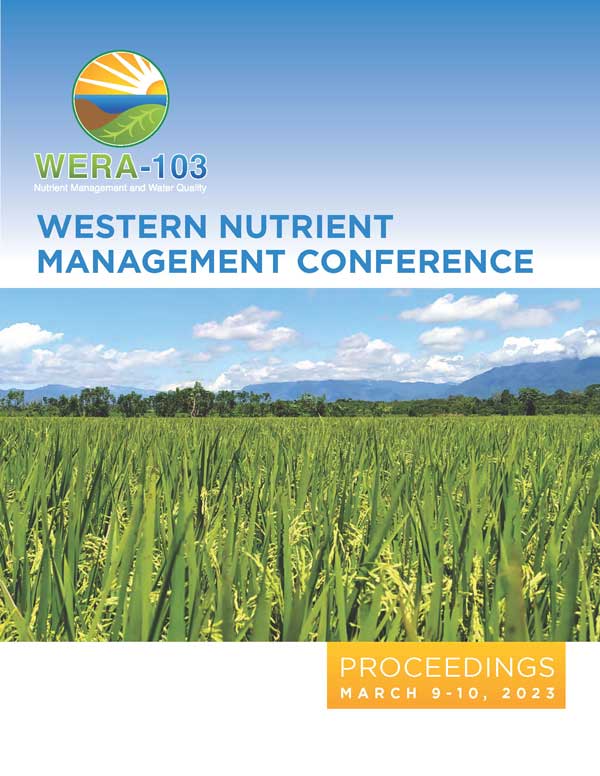Download the Conference Proceedings
Proceedings
Authors
| Filter results8 paper(s) found. |
|---|
1. Determining Lime Requirements for Idaho SoilsFor the past 25 years, northern Idaho soils have significantly shown a decline in soil pH, from pH 6.0 to around a pH of 5.6. Southern Idaho soils are mostly neutral to alkaline, with a pH of around 7.0 to 8.5, however, most agricultural soils pH is declining to pH < 4.5. Soil acidification is becoming a rising issue in soil sustainability, in which approximately 30% of the world surface is covered by acidic soils. Low soil solution pH can be induced by continued irrigation that increases... K.L. Mookodi, J. Spackman, J. Sagers, K. Schroeder |
2. Barley Yield and Protein Response to Nitrogen and Sulfur Rates and Application TimingThe introduction of new barley varieties, as well as changes in management practices, necessitate a re-evaluation of nitrogen (N) and sulfur (S) nutrient management guidelines. Nitrogen has a significant impact on barley grain quality and yield. Overapplication of N can result in lodging, groundwater pollution, and high protein content, resulting in lower end-use quality of barley, while underapplication of N results in reduced grain quality and yield. Sulfur promotes N utilization in barley plant... O. Adeyemi, J. Spackman, J. Sagers, J. Marshall, Z. Hong, R. Findlay, J. Bevan |
3. Using Calcium Hydroxide for Lime Incubation Studies and Moisture Effects on LimingPlant health and productivity are negatively affected by soil acidity. Soil physical properties such as soil texture, soil organic matter, and nutrient content help soils resist changes in their acidity (buffering capacity). Soils have different buffering capacities; agricultural producers need to know how responsive a soil is to lime and how much lime is required to modify a soil to a certain pH (lime requirement). One method to evaluate soil liming requirements and buffering capacity is to add... C. Collins, E. Loera, R. Reid, J. Spackman |
4. Optimizing Nitrogen Fertilizer Rates for Annual Cereal Forage ProductionNitrogen fertilizer provides one of the greatest returns on investment but also one of the highest operating expenses for annual cereal forage production. It is important to know the total nitrogen required by a crop to optimize yield and quality and to minimize nitrogen losses to the environment. It is also possible that annual cereal forage species and cultivars will have varying responses to nitrogen availability. The objective of this study was to determine the optimal nitrogen fertilizer... J. Spackman, R. Findlay, J. Sagers, J. Pandey |
5. Nitrogen Fertilizer Rate and Timing Implications for Malt, Food, and Feed Barley Production in Southern IdahoNitrogen is an essential nutrient required to produce high-yielding barley. Nitrogen strongly impacts barley yield, grain protein, tillering, and lodging potential. Unlike other crops such as corn, available nitrogen must be carefully managed for producers to achieve both optimal yield and grain quality for malt, food, and feed barley. Exessive nitrogen availability increases grain protein concentration that may be unsuitable for malting but may be ideal for feed or food barley. The objective... J. Spackman, O. Walsh, A. Adjesiwor, O. Adeyemi, J. Sagers, R. Findlay, J. Bevan |
6. Malt Barley Yield and Quality Response to Nitrogen and Sulfur FertilityNitrogen (N) and sulfur (S) and are critical nutrients for producing high-quality malt barley but can be difficult to manage in semi-arid production systems where rainfall and, periodically, irrigation is variable. High spring precipitation or excessive irrigation events can favor N and S leaching reducing yield and grain quality. However, N fertilizer additives such as urease inhibitors, nitrification inhibitors, and controlled-release products may improve N availability. Irrigated... J. Spackman, J. Spackman, J. Hatch, J. Bevan |
7. Lime Incubation for Southern Idaho SoilsSoil acidity is a growing concern for agricultural productivity in Idaho, particularly in the eastern and northern regions where soils are trending acidic. Soil acidity below a pH 5.5 adversely affects the root development and nutrient uptake of crops like alfalfa, barley, and wheat. This study aims to determine the lime requirements for acidic soils in Idaho to optimize crop growth, specifically targeting pH levels of 5.5, 6.0, 6.5, and 7.0. Soil samples were collected from various grower fields... K. Young, J. Spackman, T. Jacobsen, J. Sagers, J. Hatch, R. Ritchie, J. Williams, K. Schroeder, A. Adjesiwor |
8. Liming for Improved Nutrient Utilization and Weed Management in WheatSoil acidification is an increasing concern for agricultural productivity in Eastern Idaho, where low soil pH threatens the yield and quality of key crops such as barley and spring wheat. Acidification occurs from the long-term application of ammonium-based fertilizers and other management practices, leading to aluminum toxicity and nutrient imbalances that inhibit root development and reduce yields. Farmers in the region are exploring strategies to address this challenge, including the use of... T. Jacobsen, J. Spackman, A. Adjesiwor, J. Sagers, K. Schroeder, J. Bevan, K. Mookodi, J. Gibbons |
